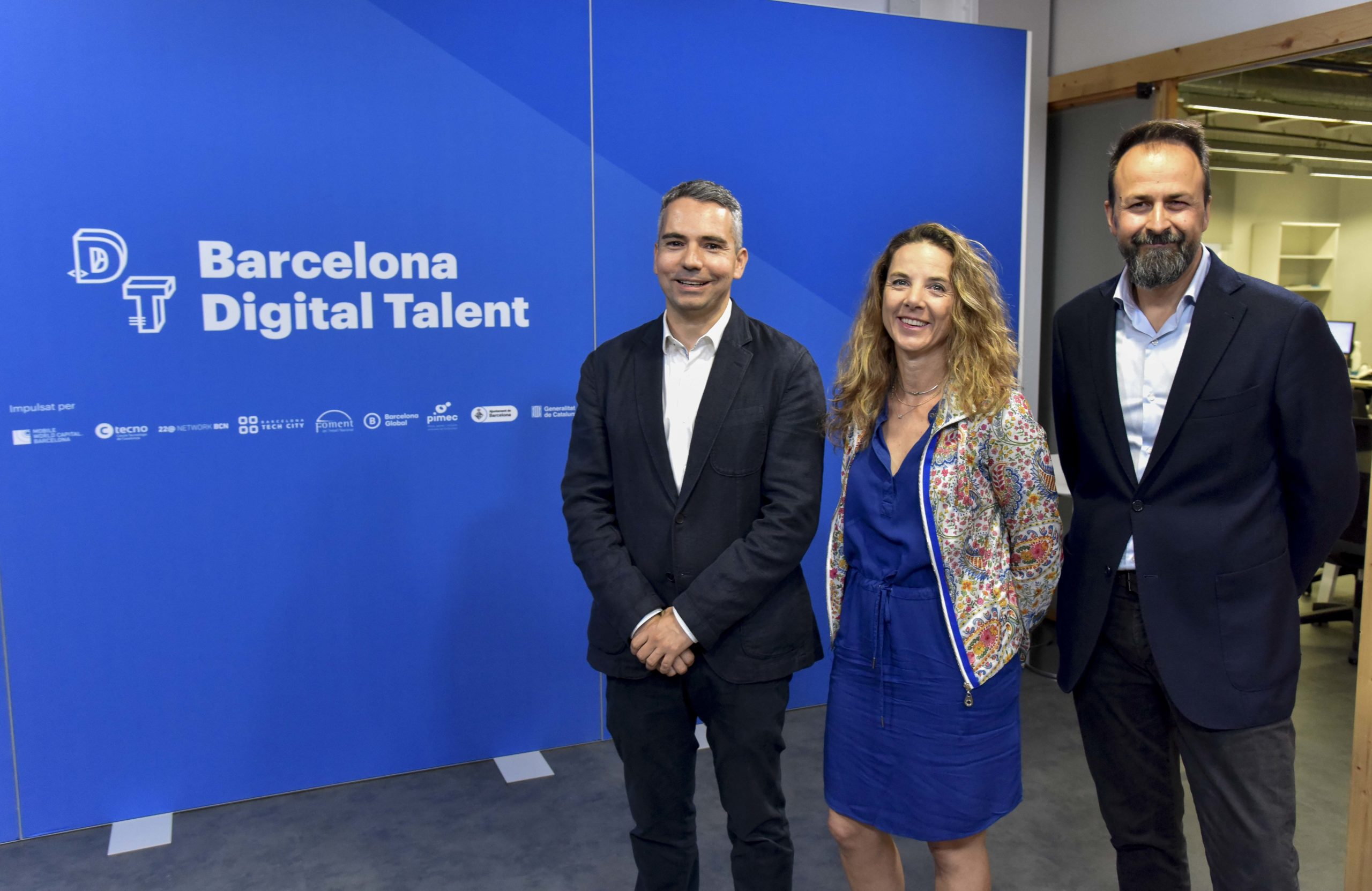- According to the ‘Digital Talent Overview 2022’ report, Catalonia has added 10,500 new digital professionals during 2021, 12% more than the previous year.
- Tarragona continues to be the territory with the most digital talents per job offer; Lleida and Girona remain very close and achieve significant increase compared to 2020.
- Barcelona reaches gender parity (50.7%) in UX/UI design, but women still only represent 29.23% of the digital workforce.

15 June, 2022
Catalonia strengthens its position as a pole of technological talent, both in terms of number of jobs, salary and graduate students. This is one of the conclusions drawn from the report ‘Digital Talent Overview 2022’, which also points out that Catalonia added 10,500 new digital professionals during 2021, hence reaching an annual increase of 12%. Availability of digital talent has grown in all Catalan districts, although Barcelona continues to concentrate 95% of the workforce as well as 97% of job offers. On the other hand, more than 1,000 digital offers were published together in Tarragona (420), Gerona (276) and Lleida (216) during the year 2021.
The report, an initiative of Mobile World Capital Foundation’s Barcelona Digital Talent,
was presented today by the Mobile World Capital Barcelona Foundation (MWCapital), the Department of the Vice-Presidency and Digital Policies and Territory of the Generalitat de Catalunya and the Cercle Tecnològic de Catalunya. Catalunya’s Digital Society General Director Joana Barbany; the president of the Círculo Tecnológico de Catalunya, Joan Ramon Barrera; and the director of the Barcelona Digital Talent Jordi Arrufí attended the press conference.
The Study also shows that the demand for digital talent in Barcelona exceeds pre-pandemic figures with an increase of 43% compared to the previous year. This rapid recovery stands in strong contrast to demand for employment in the remaining sectors, still far from the pre-pandemic figures. For every digital job offer an average of 15 workers are available in the market; when it comes to the rest of sectors, the ratio is 1 to 60.
Barcelona lures more international talent than ever before
Barcelona added 4,700 new digital professionals to its ranks, 2.3 times more than in 2020 when restrictions were still in place. International profiles account for 31.4% of the city’s digital talent and work mainly in cybersecurity (40.55%) and application development (40.31%), following last year’s pattern. London (11.44%) and Madrid (10.15%) are the cities that export the most talent to Barcelona. Digital professionals work in a wide variety of industry sectors. In fact, technology only brings together 14% of the professionals in Girona, 12% in Lleida, 10.5% in Tarragona and 15.1% in Barcelona. In Catalonia, business services continue to be the muscle of the technology sector and represent almost 20% of all digital jobs.
The gender gap persists
According to the study, women make up for 30% of Barcelona’s digital workforce, onoe of the highest in Europe and higher than the ten European cities analyzed. In addition, Barcelona reaches gender parity in UX/UI design (50.68%).
Nevertheless, the gender gap persists in the digital sector, as women account for just 19.1% of the digital workforce in Europe. The percentage of women in the ICT sector has increased by 2.1 points since 2012 and ICT studies have seen the gender gap narrow in recent years, although the percentage of female students remains low (10%).
Which are the most in-demand ICT professionals?
The report reveals that developers, UX/UI designers and CRM/ERP consultants are the most available and in-demand (+53%). Web/app developers, interface and user experience designers, and company software implementers (CRM and ERP) account for 75% of digital talent and 60% of demand. On the other hand, cloud and cybersecurity specialists are the most difficult to find. Finally, the report also highlights that in Spain remote ICT job offers have gone from 4% in January 2020 to 14% by the end of 2021.
4.000 new community college and university graduates in Spain, with the Universitat Pública de Catalunya (UPC) leading the rankings
As far as ICT training is concerned, the Polytechnic University of Catalonia (UPC) continues to lead Spain’s rankings; however, Catalan universities are still missing at the top of the global rankings. Catalan universities saw 1,869 students graduate with ICT degrees in the 2020-2021 academic year, 7.79% more than in 2019-2020 and 27% more than five years ago. 2,285 new ICT graduates came out of community colleges in Catalonia last year, a figure below the 2,700 achieved in 2020.
See the Report:‘Digital Talent Overview 2022’
SOBRE MOBILE WORLD CAPITAL BARCELONA
Mobile World Capital Barcelona is an initiative driving the digital advancement of society while helping improve people’s lives globally. With the support of the public and private sector, MWCapital focuses on four areas: the acceleration of innovation through digital entrepreneurship, the transformation of industries through digital technology, the rise of digital talent among new generations and professionals and the reflection on the impact of technology in our society. Collectively, our programmes are positively transforming the economy, education and society. MWCapital hosts MWC in Barcelona and founded 4 Years From Now (4YFN), the startup business platform, present at MWC events around the world.
ABOUT BARCELONA DIGITAL TALENT
Barcelona Digital Talent aims to bridge the digital talent gap in order to promote market competitiveness and position Barcelona as an International talent pole. This Mobile World Capital Barcelona ‘s program promotes the reskilling and digital skills training in alliance with Círculo Tecnológico, 22@Network, Tech Barcelona, Foment del Treball Nacional, Barcelona Global, PIMEC, Barcelona City Council and the Generalitat de Catalunya.
Stay up to date about everything
Subscribe to stay up to date with the latest content from Mobile World Capital Barcelona.
